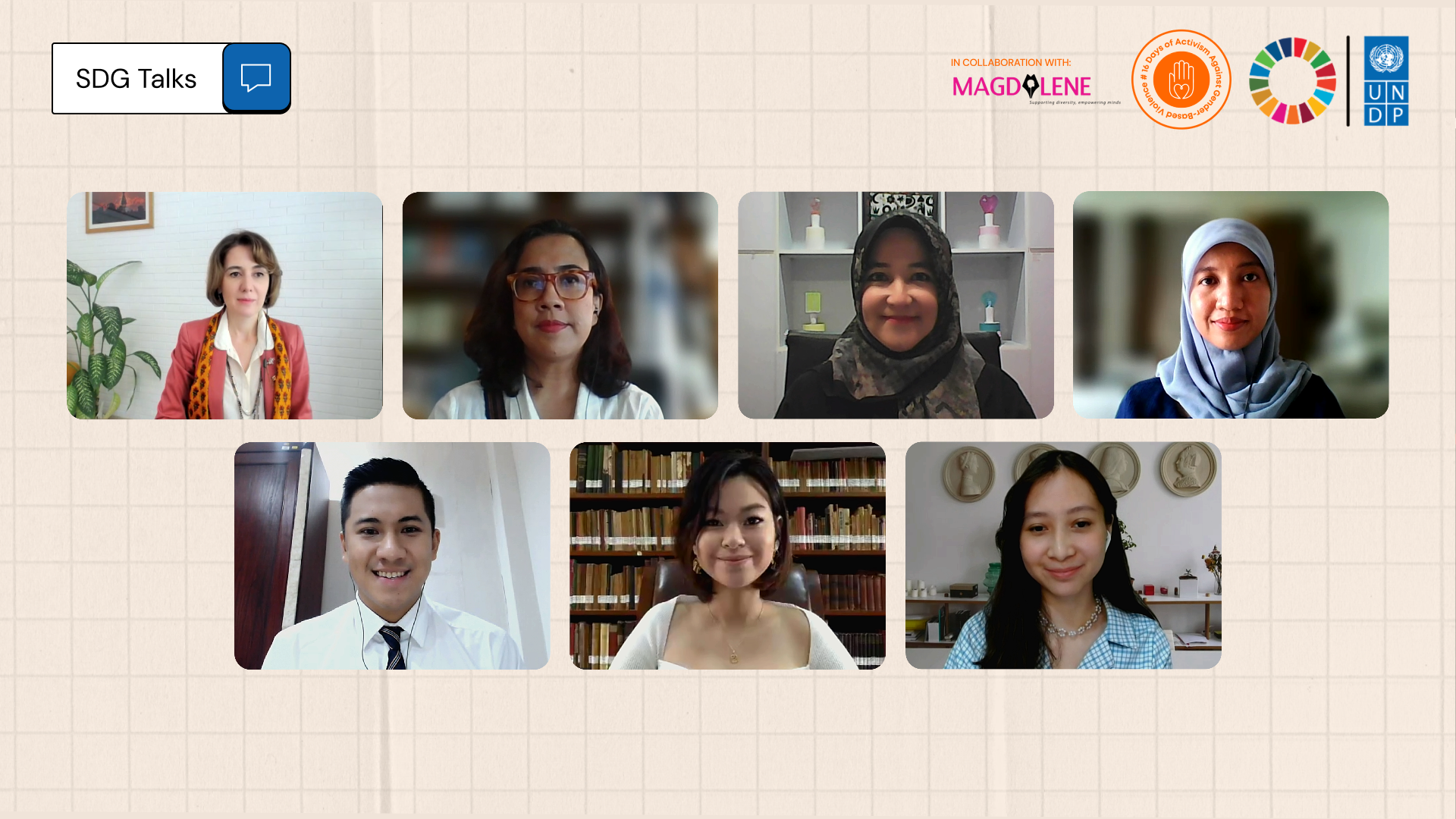Wrapping up the annual 16 Days of Activism Against gender-based violence campaign, this month's SDG Talks focused on how fans of music groups could collectively create an impact in the fight against gender based violence (GBV). The panel, drawn from a variety of fields including media and development, examined the problems in tackling this critical issue and called for more collaborative action.
The all-women panel included Hera Diani, co-founder of feminist media portal Magdalene.co was invited to join the discussion along with Pristi Gusmatahati, Deputy General Manager SM Entertainment Indonesia, Gustika Hatta, co-director of Girl, Peace, and Security, and Atik Kumala Dewi, Gender and Social Inclusion Specialist UNDP Indonesia.
UNDP Indonesia Deputy Resident Representative, Sophie Kemkhadze kicked off the discussion by urging youngsters to understand their power to create change.
"I hope that today's discussion by the remarkable women on our panel today will inspire you to take action and that you, too, will find ways to end violence against women," she began. "We need all of you – and your collective energy – to galvanize support and to amplify the urgency of these messages so that women are given an equal platform, free from fear, and to guarantee their human rights," she continued.
Journalist and presenter, Marvin Sulistio, who moderated the discussion, began by questioning how fandoms —groups of fans of music bands — were perceived by external audiences. Hera Diani responded by saying that throughout history, fandoms were usually groups of women, and were often perceived negatively.
"Unfortunately, our mainstream media still carries this bias these days," she said, adding, "These negative preconceptions have led to incorrect assumptions and harmful behavior." "However, there is a significant link between fangirls and gender-based violence, both as victims and as a unified voice to raise awareness."
Gustika echoed Hera's views, adding "In the K-pop phenomenon, Asian men, in particular, are seen as not being manly enough, which carries a tone of gender inequality in our society," she said.
Many fans of music groups are concerned about GBV because harassment can occur both within and outside of their networks, she added.
"Fandoms are not a political group or movement with rules and leaders," Gustika explained, emphasizing that "they are concerned about societal issues, such as GBV, and urge their members to take action."
When asked about solidarity within fandom groups, Pristi noted that this is not a new trend.
"Collective activity such as fundraising within fandom members has been around for a while, showing a high solidarity among fandom members." With growing numbers of men joining fandom groups, Pristi was optimistic about the active role fandom members have taken to create a positive influence on society.
Atik Kumala Dewi spoke about UNDP's interventions, particularly its work with universities. "We can prevent GBV. Currently, UNDP Indonesia works with service providers including universities to provide a safe and clear reporting system for GBV victims. The system also works to raise understanding and to educate more people about the issue. The POS SAPA (Sahabat Perempuan dan Anak/ Friendly Women and Children Center) currently operates in 11 universities in Jakarta to educate and to provide a safe reporting system for the GBV victims," she said
So, what can we do to prevent GBV?
"Be informed about gender-based violence, create a support system for GBV survivors to feel safe. We also need to address inclusivity, including the safety for people with disabilities," Atik noted.
Gustika also added a way to prevent the GBV. "Always believe survivors," she said.
Hera raised the issue of cyberbullying." Lean how to use social media safely and protect yourself," she said."
Pristi gave an example of how SM's fandom members might communicate safely. "SM Entertainment has a specialized team that communicates with fans via social media, emails, and other channels. We are willing to gather proof and information in similar circumstances to safeguard the safety of our followers."
-
Written by Enggi Dewanti
Edited by Tomi Soetjipto and Ranjit Jose

 Locations
Locations
